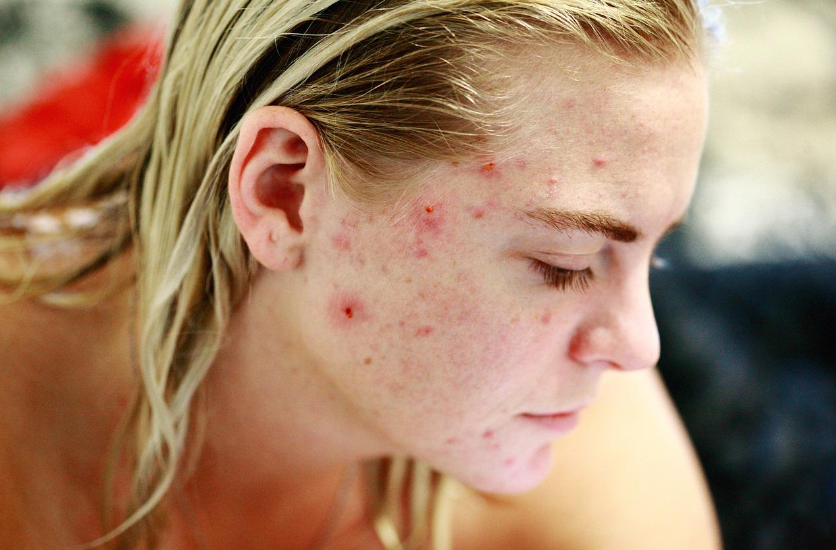Blog Layout
Scalp Psoriasis Treatment At Pine Belt Dermatology & Skin Cancer Center
Kristen Richardson, PA-C • November 8, 2018

Psoriasis is an autoimmune disease that affects the skin, and it can occur anywhere on the skin. When it forms on the scalp it is called “scalp psoriasis”. Regardless of where psoriasis forms, the cause is the same. Psoriasis develops when a person’s immune system has faulty signals that tell skin cells to grow too quickly. New skin cells form in days rather than weeks. The body does not shed these excess skin cells. The skin cells pile up on the surface of the skin, causing patches of psoriasis to appear. Researchers estimate that at least 50% of people with plaque psoriasis will have at least one flare-up on the scalp. Scalp psoriasis can extend beyond the scalp. It can appear on the forehead as shown in the picture on this page. Sometimes, it extends to the back of the neck, below the hairline, or appears behind the ears. Scalp psoriasis varies in size and can occur in small patches or cover the entire scalp. Scalp psoriasis can be extremely hard to manage, however, the providers at Pine Belt Dermatology & Skin Cancer Center are here to help.
When psoriasis appears on the scalp you will notice the following symptoms:
- Dandruff: like flaking and silver scaling: Scalp psoriasis can look a lot like dandruff. Many people who have scalp psoriasis see flaking. But there are differences between scalp psoriasis and dandruff. Unlike dandruff, scalp psoriasis causes a silvery sheen and dry scale on the scalp. It can also be extremely itchy. Approximately 70-90% of people with psoriasis experience a constant itching.
- Itching: This is one of the most common symptoms. For some the itch is mild; others have intense itching that can interfere with everyday life and cause sleepless nights.
- Reddish patches on the scalp: Some patches are barely noticeable. Patches also can be very noticeable, thick, and inflamed.
- Dry scalp: with scalp psoriasis the scalp may be so dry that the skin cracks and bleeds.
- Bleeding: Because scalp psoriasis can be very itchy, almost everyone scratches. Scratching can make the scalp bleed. Scratching also tends to worsen the psoriasis. Scratching can make the patches larger and thicker.
- Burning sensation or soreness: The scalp can burn. It can feel extremely sore.
- Temporary hair loss: Scratching the scalp or using force to remove the scale can cause hair loss. Once the scalp psoriasis clears, hair usually regrows.
The signs and symptoms of scalp psoriasis can come and go. Some patients will only experience mild flares on their scalps, where others may have multiple flare ups. These flares can range from mild to serious. These flare ups can be caused by many triggers, including stress, cold weather, and dry air. These triggers are why people with psoriasis will notice that they have many more flare-ups during the winter than in the summer.
There are treatment options available for scalp psoriasis. Most of the treatments are in the form of a shampoo or topical solution. There are a few remedies that are over-the-counter, however the most effective ones are prescribed by a dermatologist. The following types of treatment can help with scalp psoriasis:
- Medicine applied to the scalp
- Medicated shampoos
- Scale softeners
- Injections
- XTRAC laser light therapy
- Biologics
One of the treatment options that Pine Belt Dermatology offers is called XTRAC, which is concentrated UVB light that targets only the affected skin. UVB light, which naturally comes from sunlight, can significantly improve psoriasis affected areas. This is why patients who have psoriasis see less flare-ups in the summer because they are typically exposed to more sunlight. However, patients with scalp psoriasis may have a more stubborn experience. Because of the shielding effect of hair, it is more difficult for psoriasis on the scalp to become exposed to natural sunlight. How dare your hair do its job in protecting your scalp? This is also why the traditional UVB lamp therapy has not been very effective against scalp psoriasis. While we have seen improvement with all of our psoriasis patients, scalp psoriasis patients have benefited the most from PBD offering the XTRAC laser. During clinical trials with this therapy, nearly all of the scalp psoriasis patients studied achieved improvement of 50% or greater.
Many patients can achieve relief from medicated shampoos or other topical treatments. Below are some of the most commonly prescribed treatments. The treatment regimen prescribed by your dermatologist can contain more than one of these treatments.
- Corticosteroids: this therapy is the most common one prescribed for scalp psoriasis in children and adults. This is because the corticosteroids quickly reduce the itching, redness, swelling, and scale. This is often the most effective topical treatment to apply to the scalp. While this is a relatively safe treatment, side effects can occur after long-term use and your dermatologist may recommend another treatment to use with the corticosteroid.
- Medicated shampoos: If you have stubborn scalp psoriasis, you may be prescribed a shampoo that contains clobetasol propionate. This treatment can safely be used every day for up to four weeks. It is also safe to use once or twice a week to maintain long term results. Be cautious when shampooing. It is recommended that you be gentle when applying the medicated shampoo. Rubbing, scratching, and scrubbing your scalp can worsen existing psoriasis.
- Scale Softeners: sometimes the psoriasis on your scalp can become thick, and when that happens it can be hard for the treatment that you apply to be effective. A product that contains salicylic acid can soften thick, stubborn patches, making it easier for you to apply effective treatments.
- Calcipotriene: this is a manmade form of Vitamin D3 that many people apply to the scalp before going to bed. Sometimes it may be beneficial for you to apply this and cover the area with a shower cap. This will help make sure the medicine penetrates the thick patches of psoriasis. In the event that you need stronger medications, your dermatologist may prescribe a medication that combines calcipotriene and a strong corticosteroid. This will help with reducing psoriatic irritation on the scalp.
- Tazarotene: most people apply a thin layer of this medicine to their scalp before going to bed. When they wake up, they shower it off. As with calcipotriene, a strong corticosteroid may be added to your treatment plan. This can help you have better clearing.
- Coal Tar: this is a treatment that is used less often today since there are other options available. Coal tar may be recommended if your scalp itches. Many of the psoriasis shampoos that you shop for will contain coal tar. The ones that contain a weaker concentration of coal tar can actually be purchased over the counter.
There are a few treatments that you will receive at the office when you visit one of our providers at Pine Belt Dermatology. If psoriasis fails to clear with treatments applied to the scalp such as the ones listed above, or you have thick psoriasis, we may recommend an in house treatment. This is where you come in and we administer the treatment rather than have you perform it on yourself at home. Such treatments include, but are not limited to, injections of corticosteroids directly into the scalp, injection of biologics into the affected areas, and excimer laser (XTRAC laser) targeted areas.
Lastly, I wanted to share some hair loss prevention tips. When psoriasis develops on the scalp, hair loss can sometimes follow. The hair typically regrows once the psoriasis heals or clears, however there are some things that you can do to help prevent further hair loss during a flare-up.
- Gently comb/brush away the scale – to treat scalp psoriasis, you must loosen and remove the scale. However, in order to prevent hair loss, you should remove the scale gentle.
- Avoid picking the scale – this will further aggravate the skin and cause your psoriasis to flare.
- Get treatment on your scalp – treatments help clear the scalp of psoriasis and so to prevent prolonged flares, which result in further hair loss, try to apply medicine or medicated shampoo to your scalp during flares.
- Fingernail maintenance – scalp psoriasis is extremely itchy which makes it difficult to avoid scratching the scalp. Make sure that your fingernails are short and the edges remain smooth. Short, smooth nails can prevent you from scratching so hard that you loosen your hair or cause your scalp to bleed.
- Alternate shampoos – if you alternate your medical shampoos this will prevent your scalp from feeling extremely dry.
- Use conditioner – if you use conditioner after every shampoo, this will help your scalp feel less dry. Using non-medicated conditioner can also help reduce the scent of a medicated shampoo, especially if you are using medicated shampoo daily.
- Let your hair air dry – as often mentioned above, it is important to prevent your scalp from becoming dry when possible. Since patients with scalp psoriasis have dry scalps, blow drying your hair after a shower will only augment the problem of dry skin. It is for this reason that it is important to let your hair air dry after a shower.
- Chose the right hair care products – hair color, straightening products, and hair sprays can boost self-esteem, but they can also dry your hair and irritate your scalp. Before using a hair-care product, dab a small amount on your scalp and let it stay there a while. If your scalp feels irritated in a few hours, swap that product for something gentler. Be sure to test every product.
- Change psoriasis treatment – be sure to tell your provider if your psoriasis treatment seems too harsh. Skin on the scalp is thick, so treatment for scalp psoriasis is often stronger than treatment applied to other areas. If your treatment seems too strong, tell your dermatologist. Your dermatologist may switch treatments or change how you use the current one.
- Let a provider know if hair loss continues - People lose hair for many reasons. Your hair loss could be caused by something other than your scalp psoriasis. A dermatologist can look for the cause of your hair loss.
At Pine Belt dermatology & Skin Cancer Center we specialize in medical and general dermatology. We diagnose and treat acute and chronic conditions, and scalp psoriasis is most definitely one of those conditions that we have become experts at treating. All of my colleagues have extensive experience in managing this condition. In general, a vast number of people with psoriasis tend to be unhappy with their treatments. You do not have to be one of those people. At Pine Belt Dermatology & Skin Cancer Center we can help you achieve healthy skin, because healthy skin is beautiful skin!

October 25, 2024
You’ve likely felt it in your life: that uncomfortable feeling of tightness, flakiness, and sometimes even itchiness that can make your skin look and feel less than its best. But what exactly causes dry skin, and how do you treat it? Don’t fret because we’ve put together some treatment tips that can help your dry skin regain its moisture.

April 1, 2024
As the spring season unfolds, many individuals eagerly anticipate spending more time outdoors, reveling in the beauty of blooming flowers and vibrant landscapes. However, for some, spring brings about a different experience—one characterized by itchy, irritated skin and uncomfortable allergic reactions. Skin conditions associated with allergies or heightened exposure to outdoor elements can significantly impact individuals' quality of life during this time.

March 1, 2024
Skin cancer is one of the most common types of cancer worldwide, affecting millions of people every year. The good news is that, with early detection, the majority of skin cancers are highly treatable. Regular skin cancer screenings play a crucial role in identifying potential issues before they escalate.

January 30, 2024
As winter blankets the world in a serene layer of snow and chilly temperatures, many of us tend to believe that the need for sunscreen diminishes along with the intensity of the sun's rays. The misconception that sunscreen isn’t essential during the winter can lead to unintended consequences for our skin.
Petal Office
Phone:
Address:
Hours of Operation:
Mon-Fri: 8:00am to 4:30pm
Hattiesburg Office
Phone:
Address:
Hours of Operation:
Mon-Fri: 8:00am to 4:30pm
Ellisville Office
Biloxi Office
Ocean Springs Office
© 2024
All Rights Reserved | Pine Belt Dermatology







